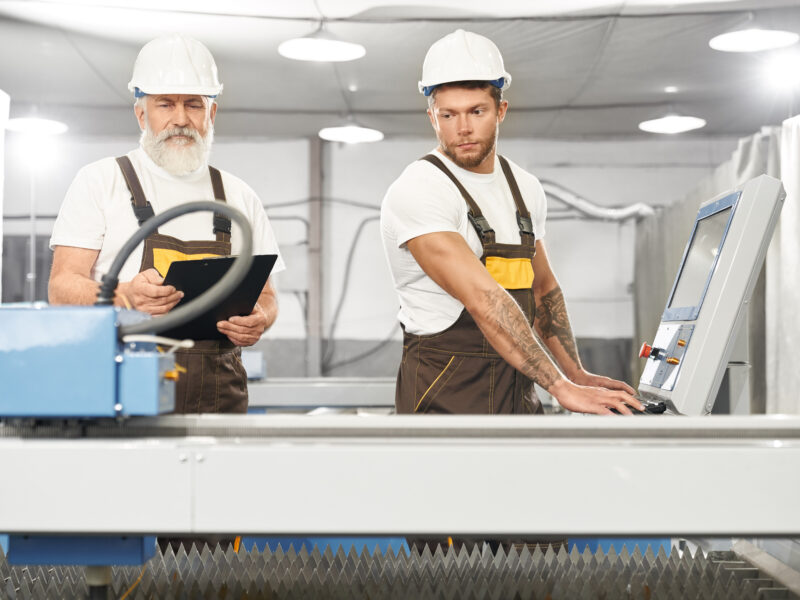
Introduction
CNC (Computer Numerical Control) machines have transformed the manufacturing landscape, offering unparalleled precision, efficiency, and versatility. These machines are essential for modern manufacturing, enabling businesses to produce complex parts with high accuracy and consistency. In this article, we will explore the key features and benefits of CNC machines for manufacturers.
Key Features of CNC Machines
1. Precision and Accuracy
High Tolerance Levels
CNC machines are renowned for their ability to maintain extremely tight tolerances, ensuring that each part produced meets exact specifications. This level of precision is crucial for industries like aerospace, automotive, and medical devices.
Repeatability
One of the standout features of CNC machines is their repeatability. Once programmed, these machines can produce identical parts repeatedly with minimal deviation, reducing waste and ensuring consistency.
2. Versatility
Multi-Axis Machining
CNC machines come in various configurations, including 3-axis, 4-axis, and 5-axis machines. This multi-axis capability allows for the production of complex geometries and intricate designs that would be difficult or impossible with traditional machining methods.
Wide Range of Materials
CNC machines can work with a diverse array of materials, including metals (steel, aluminum, titanium), plastics, wood, and composites. This versatility makes them suitable for a wide range of applications across different industries.
3. Automation and Efficiency
Reduced Human Error
By automating the machining process, CNC machines significantly reduce the likelihood of human error, resulting in higher quality products and fewer defects.
Increased Production Speed
CNC machines operate at high speeds, allowing for faster production cycles. This increased speed translates to higher productivity and shorter lead times, which is critical in competitive manufacturing environments.
4. Advanced Control Systems
Computer-Aided Design (CAD) Integration
CNC machines seamlessly integrate with CAD software, enabling manufacturers to design parts digitally and then directly translate those designs into precise machine instructions. This integration streamlines the workflow from design to production.
Real-Time Monitoring
Modern CNC machines are equipped with advanced control systems that offer real-time monitoring and diagnostics. This feature allows operators to track the machine’s performance, identify issues promptly, and ensure optimal operation.
5. Customization and Flexibility
Quick Changeover
CNC machines are designed for quick and easy changeovers between different jobs. This flexibility allows manufacturers to switch between production runs efficiently, making it ideal for both small batch and mass production.
Custom Tooling
Manufacturers can customize tooling to meet specific production needs, enhancing the machine’s capability to handle unique and complex tasks.
Benefits of CNC Machines for Manufacturers
1. Cost Savings
Reduced Labor Costs
Automation reduces the need for manual labor, lowering labor costs and minimizing the risk of costly errors. Operators can oversee multiple machines simultaneously, further enhancing cost efficiency.
Material Efficiency
The precision of CNC machines ensures optimal material usage, reducing waste and lowering material costs. This efficiency is especially beneficial when working with expensive raw materials.
2. Improved Product Quality
Consistent Quality
The high precision and repeatability of CNC machines ensure that each part produced meets the same high standards, resulting in consistent product quality and customer satisfaction.
Complex Designs
CNC machines enable the production of complex and intricate designs that would be challenging or impossible with manual machining. This capability allows manufacturers to offer innovative and high-value products.
3. Enhanced Productivity
Faster Production Cycles
The speed and efficiency of CNC machines lead to shorter production cycles, allowing manufacturers to meet tight deadlines and increase output.
Continuous Operation
CNC machines can operate continuously with minimal downtime, maximizing productivity. Some machines are capable of running 24/7, providing a significant boost to manufacturing capacity.
4. Flexibility and Adaptability
Scalability
CNC machines are suitable for both small and large-scale production. Manufacturers can easily scale their operations based on demand without compromising on quality or efficiency.
Adaptation to Market Changes
The flexibility of CNC machines allows manufacturers to quickly adapt to changing market demands and trends, offering a competitive edge in a dynamic market environment.
5. Enhanced Safety
Operator Safety
CNC machines reduce the need for manual intervention in hazardous processes, enhancing operator safety. The enclosed nature of many CNC machines also provides additional protection from moving parts and debris.
Error Detection
Advanced control systems can detect errors and anomalies in real-time, preventing potential accidents and ensuring safe operation.
Conclusion
CNC machines are a cornerstone of modern manufacturing, offering a range of features and benefits that enhance precision, efficiency, and versatility. By investing in CNC technology, manufacturers can achieve significant cost savings, improve product quality, and boost productivity. As the manufacturing landscape continues to evolve, CNC machines will remain integral to driving innovation and maintaining a competitive edge.
